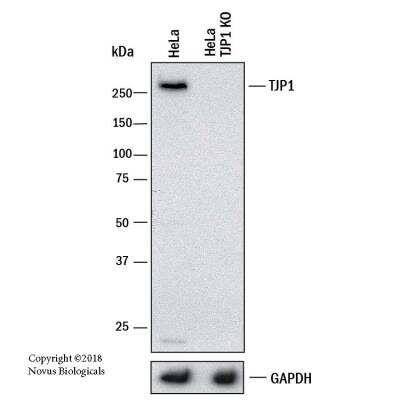Tight Junction Protein 1 Antibody
Novus Biologicals, part of Bio-Techne | Catalog # NBP1-85047

Key Product Details
Validated by
Knockout/Knockdown, Independent Antibodies, Tagged Protein Expression
Species Reactivity
Validated:
Human, Mouse, Rat, Porcine
Cited:
Human, Mouse, Rat
Applications
Validated:
Immunocytochemistry/Immunofluorescence, Immunohistochemistry, Immunohistochemistry-Paraffin, Simple Western, Western Blot
Cited:
Block/Neutralize, IF/IHC, Immunocytochemistry/ Immunofluorescence, Immunohistochemistry, Immunohistochemistry-Paraffin, Simple Western, Western Blot
Label
Unconjugated
Antibody Source
Polyclonal Rabbit IgG
Concentration
Concentrations vary lot to lot. See vial label for concentration. If unlisted please contact technical services.
Product Summary for Tight Junction Protein 1 Antibody
Immunogen
This antibody was developed against Recombinant Protein corresponding to amino acids: RKLYERSHKLRKNNHHLFTTTINLNSMNDGWYGALKEAIQQQQNQLVWVSEGKADGATSDDLDLHDDRLSYLSAPGSEYSMYSTDSRHTSDYEDTDTEGGAYTDQELDETLNDEVGTPPESAITRSSEPVRED
Reactivity Notes
Human reactivity reported in scientific literature (PMID: 24300555). Porcine and mouse reactivity reported from verified customer reviews.
Marker
Intercellular Junctions/Tight Junction Marker
Clonality
Polyclonal
Host
Rabbit
Isotype
IgG
Scientific Data Images for Tight Junction Protein 1 Antibody
Knockout Validated: Tight Junction Protein 1 Antibody [NBP1-85047] - Western blot shows lysates of HeLa human cervical epithelial carcinoma parental cell line and TJP1 knockout (KO) HeLa cell line. PVDF membrane was probed with 1:200 of Rabbit Anti-Human TJP1 Polyclonal Antibody (Catalog # NBP1-85047) followed by HRP-conjugated Anti-Rabbit IgG Secondary Antibody (Catalog #HAF008). Specific band was detected for TJP1 at approximately 260 kDa (as indicated) in the parental HeLa cell line, but is not detectable in the knockout HeLa cell line. This experiment was conducted under reducing conditions.
Simple Western: Tight Junction Protein 1 Antibody [NBP1-85047] - Simple Western lane view shows a specific band for TJP1 in 0.2 mg/ml of HeLa lysate. This experiment was performed under reducing conditions using the 66-440 kDa separation system.
Applications for Tight Junction Protein 1 Antibody
Application
Recommended Usage
Immunocytochemistry/Immunofluorescence
0.25-2 ug/ml
Immunohistochemistry
1:200 - 1:500
Immunohistochemistry-Paraffin
1:200 - 1:500
Western Blot
0.04-0.4 ug/ml
Application Notes
For IHC-Paraffin, HIER pH 6 retrieval is recommended. ICC/IF Fixation Permeabilization: Use PFA/Triton X-100.
In Simple Western only 10 - 15 uL of the recommended dilution is used per data point. Separated by Size-Wes, Sally Sue/Peggy Sue.
In Simple Western only 10 - 15 uL of the recommended dilution is used per data point. Separated by Size-Wes, Sally Sue/Peggy Sue.
Please Note: Optimal dilutions of this antibody should be experimentally determined.
Reviewed Applications
Read 5 reviews rated 4.6 using NBP1-85047 in the following applications:
Formulation, Preparation, and Storage
Purification
Immunogen affinity purified
Formulation
PBS (pH 7.2), 40% Glycerol
Preservative
0.02% Sodium Azide
Concentration
Concentrations vary lot to lot. See vial label for concentration. If unlisted please contact technical services.
Shipping
The product is shipped with polar packs. Upon receipt, store it immediately at the temperature recommended below.
Stability & Storage
Store at 4C short term. Aliquot and store at -20C long term. Avoid freeze-thaw cycles.
Background: Tight Junction Protein 1
Alternate Names
DKFZp686M05161, MGC133289, Tight junction protein 1, tight junction protein 1 (zona occludens 1), tight junction protein ZO-1, TJP1, ZO1, ZO-1, zona occludens 1, Zona occludens protein 1, zonula occludens 1 protein, Zonula occludens protein 1
Gene Symbol
TJP1
Additional Tight Junction Protein 1 Products
Product Documents for Tight Junction Protein 1 Antibody
Product Specific Notices for Tight Junction Protein 1 Antibody
This product is for research use only and is not approved for use in humans or in clinical diagnosis. Primary Antibodies are guaranteed for 1 year from date of receipt.
